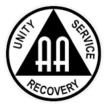Are you new to A.A.?
Am I an alcoholic?
The following test was prepared by John Hopkins University Hospital for use in determining whether or not a person is suffering from alcoholism. Ask yourself the following questions, and answer them as HONESTLY as possible.
For many years, alcoholism has been recognized as a highly prevalent and disabling health problem, one that affects far more than just the alcoholic alone. Family, friends and others are hurt by its effects — in the home, on the job, on our highways and roads. Alcoholism costs lives, as well as costing communities millions of dollars. So, whether or not you ever become an alcoholic yourself, alcoholism can still have a devastating impact on your life.
We in A.A. have learned a great deal about alcoholism — how to identify and arrest it, and how to live a life in recovery. But so far, no one has discovered a way to prevent it; it is still unknown just why some drinkers turn into alcoholics and others do not. Many doctors and scientists in the field have studied this question but have not been able to determine a definitive cause (or causes) of alcoholism.
For that reason, we in A.A. concentrate on helping those who are already alcoholics, those who may have a desire to stop drinking, so that they can begin to recover and to learn how to live a normal, happy life without alcohol.
What is Alcoholism?
As A.A. sees it, alcoholism is an illness. Alcoholics cannot control their drinking, because they are ill in their bodies and in their minds (or emotions), A.A. believes. If they do not stop drinking, their alcoholism almost always gets worse and worse. Both the American Medical Association and the British Medical Association, chief organizations of doctors in those countries, also have said that alcoholism is an illness.
What are the symptoms?
Not all alcoholics have the same symptoms, but many — at different stages in the illness — show these signs: They find that only alcohol can make them feel self-confident and at ease with other people; often want “just one more” at the end of a party; look forward to drinking occasions and think about them a lot; get drunk when they had not planned to; try to control their drinking by chang- ing types of liquor, going on the wagon, or taking pledges; sneak drinks; lie about their drinking; hide bottles; drink at work (or in school); drink alone; have blackouts (that is, cannot remember the next day what they said or did the night before); drink in the morning, to relieve severe hangovers, guilty feelings and fears; fail to eat and become malnourished; get cirrhosis of the liver; shake violently, hallucinate, or have convulsions when withdrawn from liquor.
Excerpt from the Pamphlet P-42 A brief Guide to A.A.
We in Alcoholics Anonymous do not pronounce anyone as alcoholic or non-alcoholic. This you must decide for yourself. If you think that you might be an Alcoholic and would like to know more about Alcoholics Anonymous then check out the links below.
We in Alcoholics Anonymous do not pronounce anyone as alcoholic or non-alcoholic. This you must decide for yourself. If you think that you might be an Alcoholic and would like to know more about A.A. and how it works then check out the links below.
Take the first step today
The only requirement for membership is a desire to stop drinking.
CALL US NOW
- 041-452-7328

